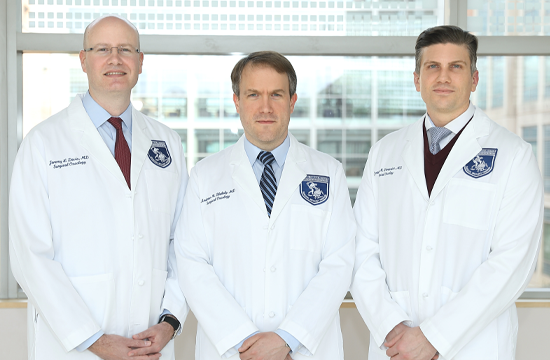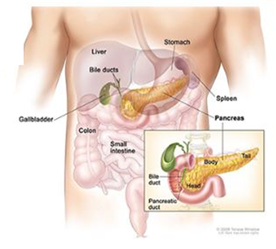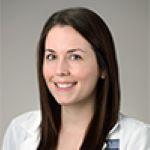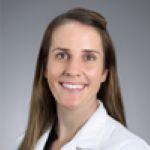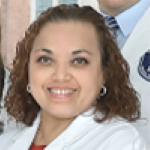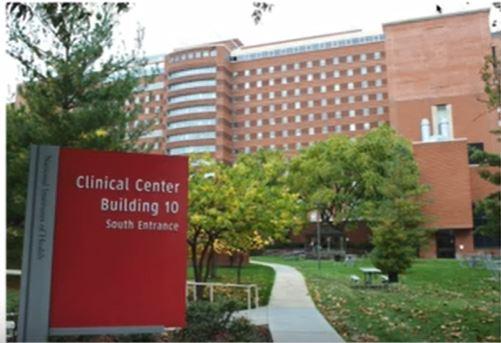Meet Our Surgical Oncology Experts
To make an in-person or virtual appointment with our team please call 240-858-3610 or email Surgical.Oncology@nih.gov.
Visit the links below to learn more about the types of cancer we treat.
- Stomach (Gastric) Cancer
- Pancreatic Cancer
- Liver and Bile Duct Cancer
- Gallbladder Cancer
- Gastrointestinal stromal tumors (GIST)
- Colon/Rectal Cancer
Our Mission
Our mission is to offer patients with tumors of the gastrointestinal tract the opportunity for better outcomes through innovative therapies in conjunction with surgery. The gastrointestinal tract includes the stomach, liver, pancreas, bile ducts and colon/rectum.Gastrointestinal cancers affect approximately 200,000 people per year in the United States and are often associated with poor outcomes even when managed with the best standard practices. We integrate local/regional therapeutics with operations to remove all tumor and prevent recurrences. We use the tumors removed during surgery in our novel ex vivo systems, which allow us to keep your tumor alive for several days. While alive
outside of your body, we study your tumor’s biology and test new agents in order to be better equipped to treat your cancer if it recurs.
The NIH Clinical Center - America's Research Hospital
The NIH Clinical Center, located in Bethesda, Maryland, is the world’s largest hospital fully dedicated to clinical research. Through clinical research, promising discoveries in the laboratory are translated into better health and health care for all.
- Currently, there are about 1,500 clinical research studies at the NIH Clinical Center.
- About half are studies of the natural history of disease, especially rare diseases. What researchers learn by studying rare diseases often adds to the basic understanding of common diseases.
- Most other studies are clinical trials, which often are the first tests of new drugs and therapies in people. The clinical trials at the NIH Clinical Center are predominantly Phase I and Phase II, often first-in-human to test safety and efficacy.
Learn more about the NIH Clinical Center
For Newly Enrolled Patients
The NIH Clinical Center Patient Portal is a secure website that connects you to important resources. The Patient Portal is designed to provide you with access to key medical information regarding care you received at the Clinical Center, including test results.
Visitor Information
Getting to NIH and the Clinical Center
Getting around the Clinical Center
NIH Campus Access and Security
Clinical Center Telephone Numbers
Hotels/Motels
Resources for New Patients
Special Campus Access
Patient Services
Patient Handbook
For Patients and Their Families
Visa and Immigration Information
Caregiver Resources
The Edmond J. Safra Family Lodge at NIH
-
Am I eligible?
You are eligible to have an in-person or virtual consultation if you have a tumor of the gastrointestinal tract.
-
How will I benefit by participating?
You will be seen by the National Cancer Institute experts in cancers of the gastrointestinal tract, (GE junction, stomach, liver, pancreas, bile duct and colon/rectum). The team includes surgical oncologists, medical oncologists, gastroenterologists, radiation oncologists, radiologists, pathologists, and research support staff. We would like to emphasize that it is not our intention to take over your care from your primary physician. However, the number of experts from different fields who are thinking about the specifics of your medical history may allow us to make recommendations to your treating physician, with the goal of improving your health.
-
Will this clinic benefit others?
The contribution that your visit to this clinic will make to the care of others cannot be emphasized enough. Our philosophy is that the opportunity to evaluate patients with cancer will help the medical community understand the mechanisms that underlie these diseases. We will have the opportunity to compile details of your history, response to prior treatments, radiographic assessments and molecular studies. The data for a single patient may not provide much insight. However, when combined with that of all other patients, the information will generate many leads to help us better understand the genetic and clinical elements of gastrointestinal cancers.
-
What is the goal of the clinic?
The data that we obtain from these clinics will help us to design innovative treatment protocols. These protocols may have a biological component (to see which biochemical pathways are activated in the tumor), a molecular component (to determine which genes are disrupted), a radiographic component (to assess different imaging modalities) and a pharmacokinetic component (to see if drug levels in your body are appropriate). Your oncologist will remain in charge of your care. Our role will be to help provide any elements of your care that may not currently be available at your hospital.
-
How do I make an appointment?
To make an in-person or virtual appointment with our team please call 240-858-3610 or email Surgical.Oncology@nih.gov.
Jonathan Hernandez, M.D.
Tenure Track Investigator
Chief of Surgical Oncology
jonathan.hernandez@nih.gov
Andrew M. Blakely, M.D.
Assistant Research Physician, Surgical Oncology
Fellowship Program Director
andrew.blakely@nih.gov
Cathleen E. Hannah, R.N.
Research Nurse
cathleen.hannah@nih.gov
Jeremy Davis, M.D.
Associate Research Physician, Surgical Oncology
Chief, General Surgery Consultative Services
Surgeon-in-Chief, NIH Clinical Center
jeremy.davis@nih.gov
Stacy Robinson Joyce, PA-C
Physician Assistant
stacy.joyce@nih.gov
Claudia Espinoza
Patient Care Coordinator
claudia.espinoza@nih.gov
NIH Clinical Center News, Winter 2018
When David Fogel had a stomach, his fast-paced life was focused on expanding Bump 'n Grind, his coffee shop and record store in downtown Silver Spring, and managing a creative agency and two co-working spaces. Incorporated into his busy schedule was raising his two little sons with his wife. Read more...
Members of the NIH Foregut Team discuss new treatment options for stomach cancer
November 30, 2017
On Wednesday, Nov. 29, 2017, NIH Foregut Team members presented information and answered questions during a webinar on stomach cancer treatment options. Jeremy Davis, M.D., Staff Clinician in the CCR Thoracic and Gastrointestinal Oncology Branch, and Theo Heller, M.D., Senior Investigator in the National Institute of Diabetes and Digestive and Kidney Diseases, joined David Fogel, a recent total gastrectomy patient, to discuss the latest advancements in treatment. The webinar, “Navigating New Treatment Options for Gastric Cancer: Reaching above and beyond the standard of care,” was facilitated by the NIH Clinical Center and Inspire, a social network for health that connects patients and caregivers in a safe, permission-based manner. Access the recorded webinar.
